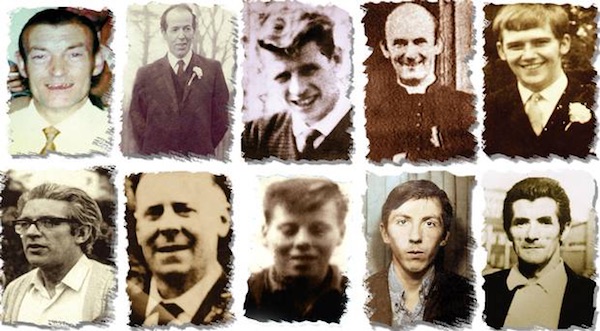
A former British military medical assistant has told the inquest into the Ballymurphy Massacre that a senior figure in the British Army asked him to plant bullets on two innocent civilians he had treated. It is thought to be one of the first incidents of British Crown Forces in Ireland attempting to falsely portray civilians as combatants.
The inquest is looking into the killings of ten people in the Ballymurphy area of west Belfast in August 1971 as Crown Forces sought to seize control of the area during the introduction of internment without trial.
Nigel Mumford was serving as a first-aid medic at a temporary British Army base at Henry Taggart Hall.
Speaking via videolink from an unknown location, Mumford said an ‘officer’ he did not recognise asked him to plant bullets on the clothes of the victims. He told Belfast Coroner’s Court that he refused to do it and that the bullets were not planted.
Mr Mumford also said he did not report the officer at the time. Asked why, he said he did not want to negatively impact his career.
“It takes a brave man to go up against an officer in the British Army,” he said.
Mr Mumford also told the inquest that he had watched a moment when soldiers opened fire on people.
The witness said he saw an officer known as ‘Lieutenant M42’ take six or seven soldiers outside the base. He said that with the permission of ‘Major M45’, the lieutenant shouted “some warnings” at what he said was a crowd of rioters, and then ordered his men to open fire on the crowd and “shoot to kill”.
The former corporal described a “fusillade of shots” for about a minute. He said he did not see the victims, and was only told that the group had “scattered” as some fell wounded or dead.
As victims were brought in, he described a number of attempts at giving first aid, admitting to frustration that his poor medical training prevented him from saving lives.
During his descriptions the families of those who died were clearly very upset.
He also observed the body of Joan Connolly being brought into the base. He told the court that a doctor present took photographs of her injuries, which he said was for training purposes.
In a discussion on the culture of the Parachute Regiment, he agreed that at times rubber bullets had been doctored with nails by other soldiers before being fired.
He also described the treatment of men arrested and interned who he said were tied up, hooded, and pushed around.
He said the internees had bags placed over their heads and their hands tied behind their back, and said they were made to believe they were going to be pushed off a table and hung. But he denied it was torture.
“It was to put the fear of God into them,” he said. “You use Paras to fight wars...” he said. “Not as cheap policemen.”
![[Irish Republican News]](https://republican-news.org/graphics/title_gifs/rn.gif)
![[Irish Republican News]](https://republican-news.org/graphics/title_gifs/harp.gif)

